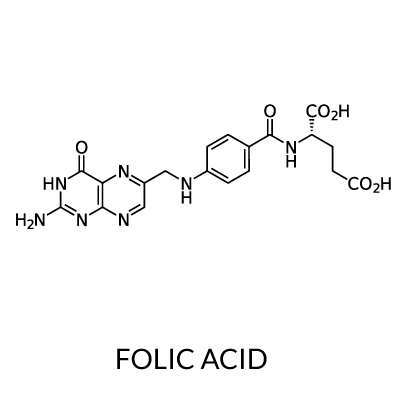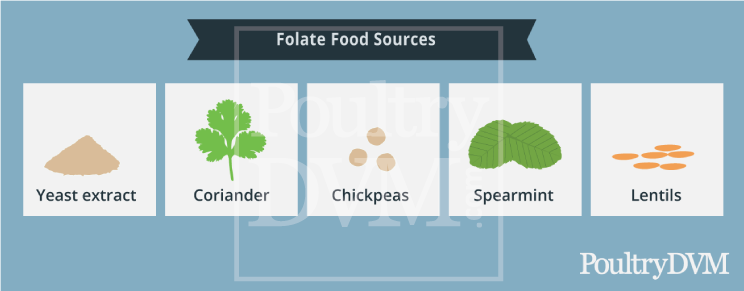Folic acid (also referred to as folate, vitamin B9 or folacin) is an essential B-vitamin needed for chickens of all ages.
Folic acid is the synthetic form of B9, found in supplements and fortified foods, while folate occurs naturally in foods. Folic acid is crucial for proper brain function and plays an important role in mental and emotional health. It aids in the production of DNA and RNA, the body's genetic material, and is especially important when cells and tissues are growing rapidly.
Folic Acid Deficiency in Chickens
Folic acid deficiency results in the megaloblastic arrest of erythrocyte formation in bone marrow, leading to severe macrocytic anemia. Chickens tend to be more susceptible to folic acid deficiency then other animals.
- Chicks: Folic acid deficiency in chicks is characterized by poor feathering, anemic appearance (waxy white comb and pale mucous membranes in the mouth), lethargy, reduced feed intake, slow growth, and abnormal skeletal development leading to perosis. A deformed beak and bending of the tibiotarsus are signs of the embryonic deficiency, which occurs as a result of folic acid deficient breeding chickens. Chicks that successfully emerge are stunted and have feathers that are poorly developed and abnormally pigmented.
- Adult Chickens: Folic acid deficiency in adult chickens often have pale combs and wattles, decreased egg production, poor feathering, and reduced hatch rates for offspring. Folic-deficient breeder hens tend to produce chicken embryos that die immediately after pipping the air cell while in the later stages of incubation. Chicks that are assisted out of their shell will often develop leg deformities.
Folic Acid Requirements for Chickens
Folic acid requirements for chickens depend on the form of feed, age of the bird, growth rate, and level of production. Generally, the chicken's folic acid requirements decreases with age because diminished growth rate reduces the need for DNA synthesis.
Folic acid nutritional recommendations for chickens at various stages of life include:
| Age/Life Stage | mg/kg |
|---|
| Newly Hatched Chicks (0 - 10 wks) | 1-1.5 |
| Young & Growing (10 - 20 wks) | 1-1.5 |
| Laying hens (Actively laying eggs) | 1-1.5 |
| Breeders (20 wks & older)* | 2.0-3 |
| Broiler/'Meat' Breed Chicks (0-18 wks) | 1.5-2 |
| Broiler/'Meat' Breeds* (19 wks & older) | 2.0-4 |
Folic Acid Food Sources
Folic acid is abundant in green leafy greens such as spinach, asparagus, mustard greens, brussels sprouts, lima beans, and root vegetables. Cereal grains, milk and eggs are generally poor sources of the vitamin. Folic acid is also found in multivitamins.
Can Folic Acid be Toxic in High Amounts?
Folic acid is considered to be relatively nontoxic, even at high amounts. Chickens have to be fed levels up to 5,000 times the normal requirements for toxic consequences to develop.

